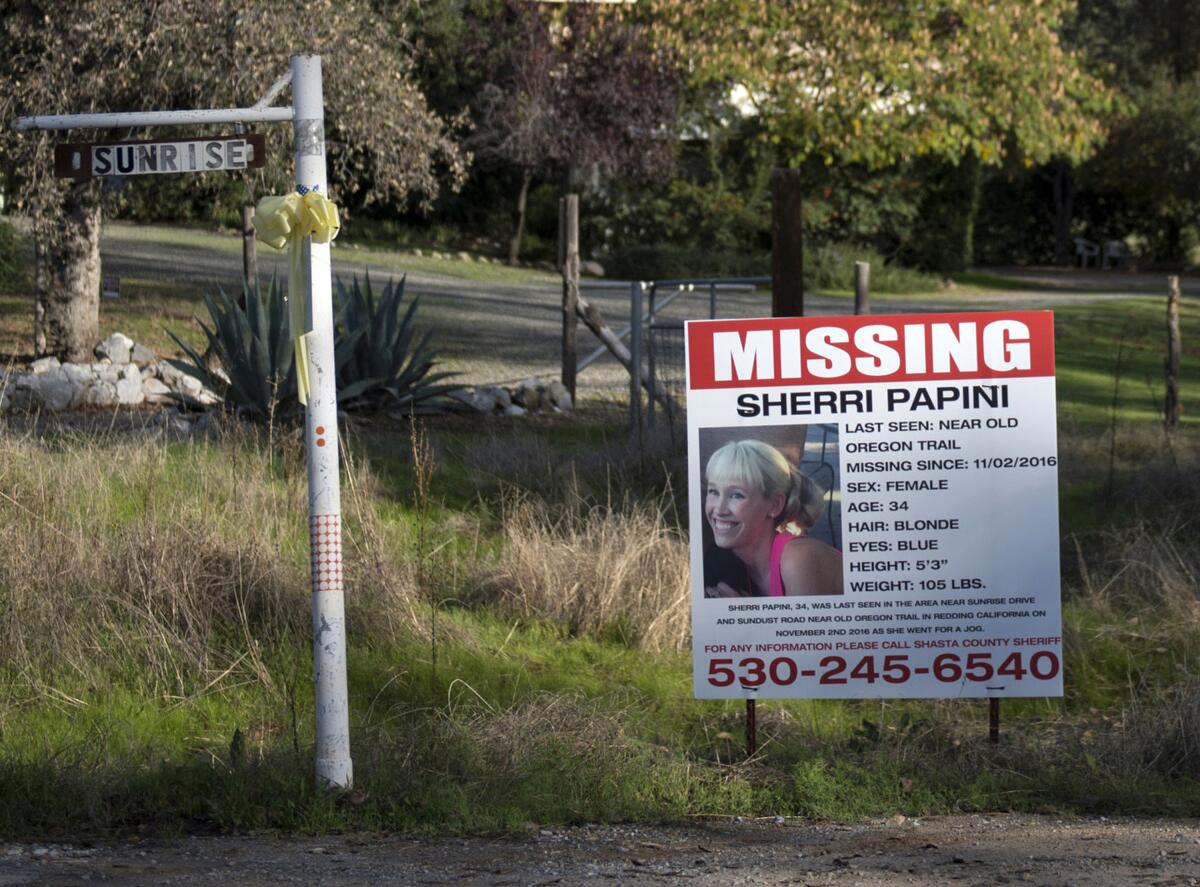Sherri Papini, accused of faking 2016 kidnapping, injured herself to further her hoax, feds say

- Share via
In 2016, three weeks into a search that had made headlines across the nation, Sherri Papini turned up on the side of a Yolo County freeway bound, emaciated and injured. The Redding mother of two described harrowing treatment at the hands of her mysterious abductors.
On Thursday, federal prosecutors said the entire incident had been a hoax. Papini, 39, was arrested and faces charges of making false statements to a federal law enforcement officer and engaging in mail fraud, according to the U.S. attorney’s office for the Eastern District of California.
Papini had vanished Nov. 2 while out for a jog in the small Shasta County town of Mountain Gate. She reappeared on Nov. 24, Thanksgiving Day.
“In truth, Papini had been voluntarily staying with a former boyfriend in Costa Mesa and had harmed herself to support her false statements,” the U.S. attorney’s office said in a release.
She could be sentenced to up to 20 years in prison if convicted of mail fraud and up to five years if convicted of lying to federal law enforcement. She also faces fines of $250,000 for each charge.
“Ultimately, the investigation revealed that there was no kidnapping and that time and resources that could have been used to investigate actual crime, protect the community, and provide resources to victims were wasted based on the defendant’s conduct,” U.S. Atty. Phillip Talbert said in the release.
As a result of the alleged kidnapping, Papini had been granted over $30,000 in about 35 payments from the California Victim Compensation Board to pay for therapist appointments and other costs, officials said.
According to the criminal complaint, investigators first began to question the story in 2020, after DNA found on Papini’s clothing upon her return was matched to one of her ex-boyfriends.
In an interview with investigators, the ex-boyfriend said Papini had told him that her husband was abusive and that local law enforcement was not investigating the incidents, according to the complaint, which noted that the Shasta County Sheriff’s Office did not have any domestic violence reports filed by Papini.
The ex-boyfriend called Papini “a good friend” and said “she had asked him for help,” according to the complaint. “Papini told him that her husband was beating and raping her and she was trying to escape.”
He picked Papini up just outside Redding in a rented car and drove her to his home in Costa Mesa, prosecutors said. Papini allegedly never left the residence during her stay.
The ex-boyfriend told investigators that Papini cut her own hair and hit herself to create bruises and burned herself on her arms.
“Ex-Boyfriend said he helped her create some of the injuries, although he never laid his hands directly on her; for example, she told him, ‘bank a puck off my leg,’ so [he] shot a puck off her leg, lightly,’” the complaint said.
He also participated in branding Papini using a wood-burning tool, according to the complaint. The ex-boyfriend then drove Papini back to the Redding area at her request, again using a rented car.
She was found before sunrise on Thanksgiving on the side of Interstate 5 with a quarter-inch-thick chain around her waist, hose clamps around her wrists, her face bruised and her nose broken, her family said.
She weighed only 87 pounds when she flagged down a motorist, who dialed 911.
She claimed her captors branded her shoulder and cut her hair to shoulder length, officials said. Her kidnappers covered their faces and usually had a bag over her head, she said.
They freed her by kicking her out of their car on the side of the road, she told authorities.
Papini described her captors as two women who spoke Spanish most of the time. She described one of the captors as having long curly hair, pierced ears, thin eyebrows and a thick accent.
In August 2020, during an interview with a federal agent and a Shasta County Sheriff’s Office detective, Papini was presented with evidence that showed she had not been abducted and was warned that lying to federal law enforcement officials is a crime, prosecutors said.
But Papini stuck to her story and continued to make claims about her abductors.
The twists and turns of her alleged kidnapping and reappearance were widely reported years ago, drawing nationwide attention even as some observers expressed disbelief at her story.
Her husband, Keith Papini, gave a statement to “Good Morning America” in the days after her reappearance rejecting the internet speculation. “We are not going to allow those people to take away our spirit, love, or rejoice in our girl found alive and home where she belongs,” he wrote. “I understand people want the story, pictures, proof that this was not some sort of hoax, plan to gain money, or some fabricated race war. I do not see a purpose in addressing each preposterous lie.”
Papini’s husband reported her missing after he came home from work and found that she hadn’t picked up their children from day care, officials said. Her cellphone and headphones were found near where she had last been seen, about a mile from her home, investigators said.
Papini’s husband had also taken and passed a polygraph test, investigators said.
Investigators looking into the incident found numerous people who painted Papini as someone who routinely exaggerated and lied to gain attention.
A man contacted by investigators, who had dated Papini in the early 2000s, described her “as an attention-hungry person who told stories to try to get people’s attention.”
“Man 2 stated that Papini fabricated stories of being the victim of abuse from her family, father, and then Man 2 after the couple broke up,” the complaint said.
The director of the youth program where the man and Papini met feared having her in the program, alleging that she “was good at creating different realities for people so that they would see what she wanted them to see, which got her really good attention.”
“We are relieved that the community is not endangered by unknown, violent kidnappers, and thank the public and media for their patience and strong support for this case since the initial reports of Sherri Papini’s disappearance,” Special Agent in Charge Sean Ragan of the FBI’s Sacramento field office said in the release.
Local officials said news of the kidnapping and the tense days and years that ensued took a toll on the community. The complaint noted that for years, the community was on the lookout for a pair of Latina women, drawing mistaken tips about “suspicious-looking” women.
“The 22-day search for Sherri Papini and subsequent five-year search into who reportedly abducted her was not only taxing on public resources but caused the general public to be fearful of their own safety, a fear that they should not have had to endure,” said Shasta County Sheriff Michael Johnson.
California Atty. Gen. Rob Bonta applauded the work of investigators into the case.
“No matter the circumstances, our team is committed to the facts. While this case deals with a tough situation, we’ll continue to do our part to help secure justice,” he said.
More to Read
Sign up for Essential California
The most important California stories and recommendations in your inbox every morning.
You may occasionally receive promotional content from the Los Angeles Times.










